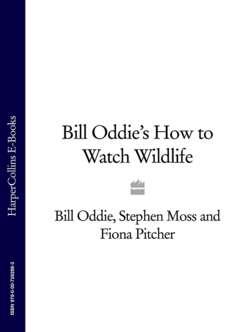Читать книгу Bill Oddie’s How to Watch Wildlife - Stephen Moss - Страница 5
ОглавлениеB
Why watch wildlife?
Because it is … (tick whichever of the following words apply): enjoyable, relaxing, therapeutic, calming, exciting, challenging, fascinating, mystifying, satisfying, solitary, sociable, amusing, dramatic, important …
Hang on. I could argue that all the above adjectives apply but … important? Is it really? This is the kind of question I’m frequently asked, especially when I’m attending a wildlife event. Inevitably, I will be interviewed by the ‘media’ – newspapers, radio, TV – and almost as inevitably the reporter will ask me: ‘So, Mr Oddie, why is (whatever the thing is) important?’ This may seem like a harmless and, indeed, supportive enquiry, but all too often it is said with a rather challenging inflexion, implying: ‘Come now, with all the problems in the world today, surely wildlife doesn’t really matter?’
In recent years, I have given up being patient and polite. Instead, I fear my response has a tinge of belligerence bordering on sarcasm. Like a typical politician, I answer the question with another question. ‘Why is music important? Why are sport, entertainment, drama or comedy important? Indeed, why are beauty, kindness, peace, love and understanding important?’ I don’t wait for the journalist to reply. ‘I’ll tell you why. Because they are all elements that make our lives richer and more enjoyable. They represent the best achievements and qualities of human beings. That is important.’
And that’s why wildlife is important too. Quite apart from the fact that wildlife has as much right to exist on this planet as we do, and that our very survival depends on natural resources, I would suggest that watching – and listening, learning about and understanding – wildlife enriches our lives. I reckon that’s pretty important, don’t you? Maybe I have come over a bit philosophical – nay, evangelical – but let’s at least accept that watching wildlife is what you want to do, otherwise you wouldn’t be reading this book.
If I had to choose a single word to encapsulate the wonder of wildlife, I think it would be ‘variety’. Birds, mammals, insects, reptiles, marine life, flowers, trees, etc., they are all wildlife. Then there is the variety within each group: from ostriches to wrens, elephants to shrews, ants to butterflies, sharks to minnows, skinks to crocodiles, porpoises to whales, and so on. OK, not all of them exist in Britain, but there’s plenty to be getting on with.
There is also variety in the way you can watch – or should I say get involved with – wildlife. It can be a hobby or a job, a pastime or an obsession. You may simply want to know more about the birds in your garden, or you may feel compelled to pursue the creatures of Antarctica or the rainforest. You can become absorbed in scientific research, or you may not wish to ‘progress’ beyond feeding the blue tits. Anything is possible. Nothing is right or wrong. Never forget that.
Whatever level you wish to be on, it’s OK. Don’t be intimidated by the difficult areas. No one finds getting to know bird songs or identifying dragonflies easy. You can accept the challenge or decide it is not for you. It doesn’t matter. And don’t be put off by the sort of ‘experts’ that talk in a language that is unintelligibly technical or esoteric. Or, to put it bluntly, you can’t understand a word he or she is on about! Believe me, I have the same problems. One of the cardinal rules I always bear in mind when we are making a TV series is that while wildlife can be fascinating, it can also be excruciatingly boring! Well, talking about it can be!
We have tried to make both this book and the TV series – how can I put it? – accessible, entertaining and informative. You may or may not wish to take things further. By all means remain merely a viewer or a reader. There is nothing wrong with a bit of armchair birding or botany, but I would venture to suggest that if you enjoy wildlife on the screen or page, you may find the real thing even better.
One of the major elements of job satisfaction for me (and the team who make our programmes) is to hear from viewers who say that they have been inspired to get out and ‘see for themselves’, and that they are now ‘hooked’. That’s great news. Because not only have we helped them discover a new interest and pleasure, it also means that one more person can be added to the conservation lobby. If you enjoy something, you want to protect and preserve it. That too is important.
I hope this book will tell you how to watch wildlife, but – even more importantly – I hope it will help you to enjoy it. Go wild and have fun.
